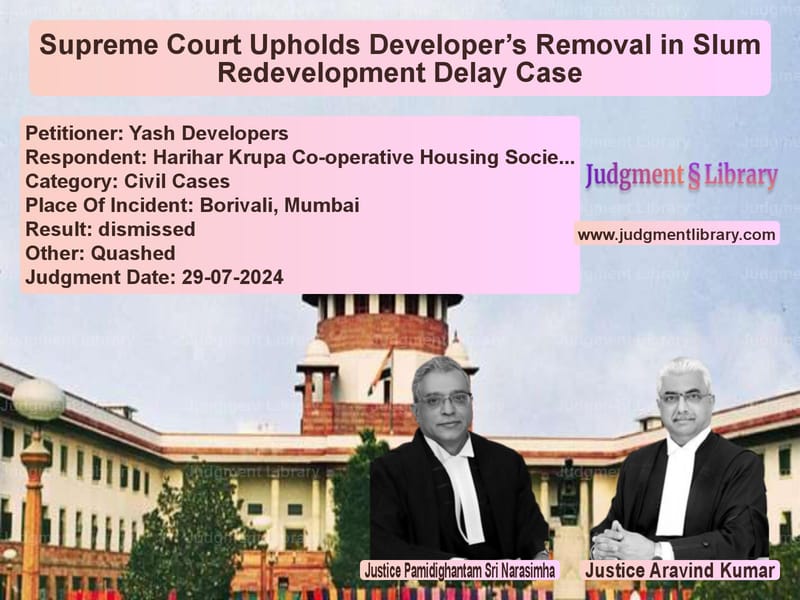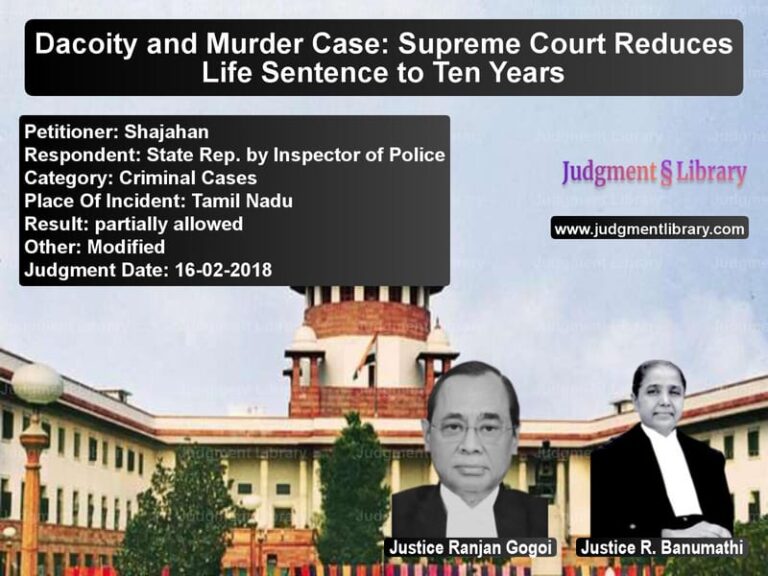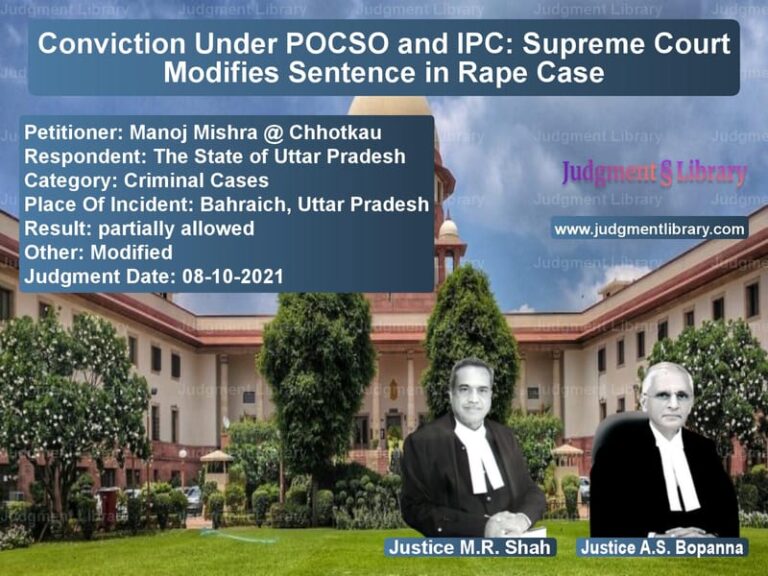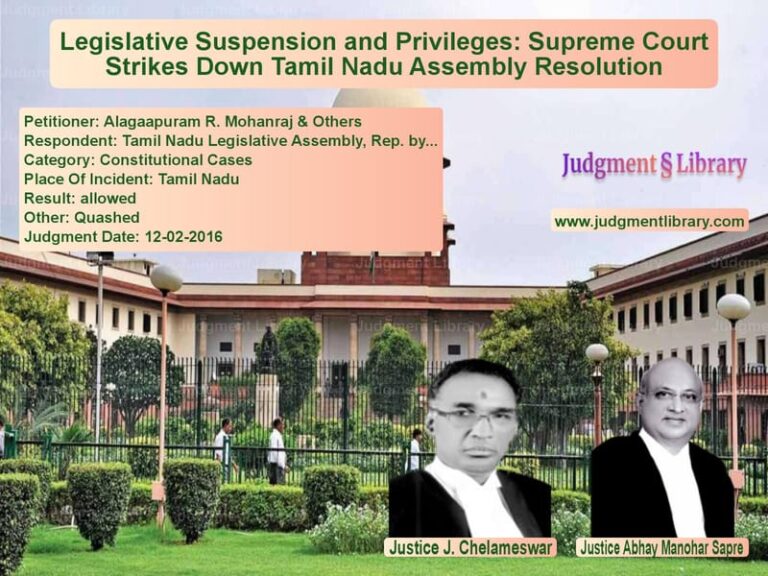Supreme Court Upholds Developer’s Removal in Slum Redevelopment Delay Case
The Supreme Court of India, in its judgment dated July 30, 2024, upheld the termination of Yash Developers as the designated developer for the slum rehabilitation project in Borivali, Mumbai, under the Maharashtra Slum Areas (Improvement, Clearance and Redevelopment) Act, 1971. The Court dismissed the appeal, affirming that the project was delayed for over 16 years, causing hardship to slum dwellers, and emphasizing that authorities must ensure timely completion of redevelopment projects.
Background of the Case
In 2003, Harihar Krupa Co-operative Housing Society Ltd., comprising slum dwellers, appointed Yash Developers for a slum redevelopment project under the Maharashtra Slum Rehabilitation Scheme. The project was expected to be completed within three years. However, the project remained stalled for over 16 years, prompting the Apex Grievance Redressal Committee (AGRC) to terminate Yash Developers’ contract in 2021.
Yash Developers challenged the termination before the Bombay High Court, which dismissed their writ petition. They then approached the Supreme Court, arguing that delays were due to litigation, regulatory hurdles, and non-cooperation by slum dwellers.
Key Issues Before the Supreme Court
- Was the termination of Yash Developers justified under Section 13(2) of the Maharashtra Slum Act?
- Did the developer take adequate steps to complete the project within the prescribed time?
- Did the authorities fail in their duty to ensure timely completion of the project?
- Could the delay be excused due to legal disputes and regulatory approvals?
Arguments by Yash Developers
The developer, represented by Kapil Sibal, argued that:
- Initial delays (2003-2011) were due to litigation with a rival builder, which prevented them from commencing construction.
- Regulatory delays (2011-2014) in obtaining environmental clearances and municipal approvals were beyond their control.
- Non-cooperation by certain slum dwellers and administrative hurdles further stalled the project.
- They had financial backing, as evidenced by agreements with third-party financers.
Arguments by Respondents
The respondents, represented by C.A. Sundaram and Huzefa Ahmadi, contended that:
- The developer failed to take proactive steps despite having the required 70% consent from slum dwellers.
- The alleged legal disputes did not prevent the developer from starting the project.
- The developer lacked financial capacity and had entered into multiple agreements transferring project rights to third parties.
- Under Section 13(2) of the Act, authorities were empowered to terminate the developer if the project was unduly delayed.
Supreme Court’s Observations
1. Developer’s Failure to Meet Timeline
The Supreme Court rejected Yash Developers’ argument that delays were justified, stating:
“Execution of a slum rehabilitation project is not a mere real estate venture. There is a public interest component that ensures slum dwellers are provided dignified housing within a reasonable timeframe.”
2. Legal Disputes Do Not Justify Delay
The Court noted that the litigation with a rival builder between 2003 and 2011 was insufficient justification for an eight-year delay. It held:
“A developer must be prepared to navigate legal and regulatory processes. Merely citing litigation cannot absolve them of their contractual obligations.”
3. Authorities’ Duty to Ensure Timely Completion
The Court criticized the Slum Rehabilitation Authority (SRA) for failing to take timely action, stating:
“The SRA’s passive role contributed to the delay. Authorities must be held accountable for ensuring that slum redevelopment projects do not languish indefinitely.”
4. Lack of Financial Capacity
The Court found that Yash Developers had entered into multiple agreements with third parties for financial assistance, indicating a lack of independent financial capability.
Final Judgment
- The Supreme Court dismissed the appeal, upholding the termination of Yash Developers.
- The developer was ordered to pay Rs. 1,00,000 in costs to the Supreme Court Mediation and Conciliation Project Committee.
- The Contempt Petition (Civil) No. 217 of 2024 was disposed of as no further orders were necessary.
Key Takeaways
- Delays in slum redevelopment will not be tolerated: The judgment reaffirms that failure to meet project deadlines can lead to termination.
- Authorities must ensure accountability: The Court directed that the Maharashtra government conduct a statutory audit of the Slum Act’s implementation.
- Litigation is not a valid excuse for project delays: Developers must be prepared to handle legal and regulatory challenges proactively.
- Financial stability is crucial: The Court scrutinized the developer’s financial agreements and found that it lacked the capacity to execute the project independently.
Conclusion
The Supreme Court’s ruling underscores the importance of timely execution of slum redevelopment projects. By upholding the termination of Yash Developers, the judgment ensures that slum dwellers are not left waiting indefinitely for their homes. The ruling also serves as a strong reminder to developers and authorities alike that slum redevelopment is a public responsibility, not just a commercial opportunity.
Petitioner Name: Yash Developers.Respondent Name: Harihar Krupa Co-operative Housing Society Limited & Ors..Judgment By: Justice Pamidighantam Sri Narasimha, Justice Aravind Kumar.Place Of Incident: Borivali, Mumbai.Judgment Date: 29-07-2024.
Don’t miss out on the full details! Download the complete judgment in PDF format below and gain valuable insights instantly!
Download Judgment: yash-developers-vs-harihar-krupa-co-ope-supreme-court-of-india-judgment-dated-29-07-2024.pdf
Directly Download Judgment: Directly download this Judgment
See all petitions in Contract Disputes
See all petitions in Damages and Compensation
See all petitions in Property Disputes
See all petitions in Judgment by P.S. Narasimha
See all petitions in Judgment by Aravind Kumar
See all petitions in dismissed
See all petitions in Quashed
See all petitions in supreme court of India judgments July 2024
See all petitions in 2024 judgments
See all posts in Civil Cases Category
See all allowed petitions in Civil Cases Category
See all Dismissed petitions in Civil Cases Category
See all partially allowed petitions in Civil Cases Category







